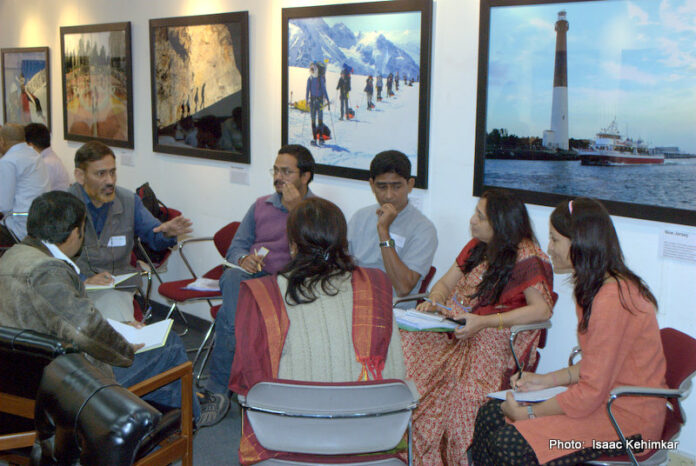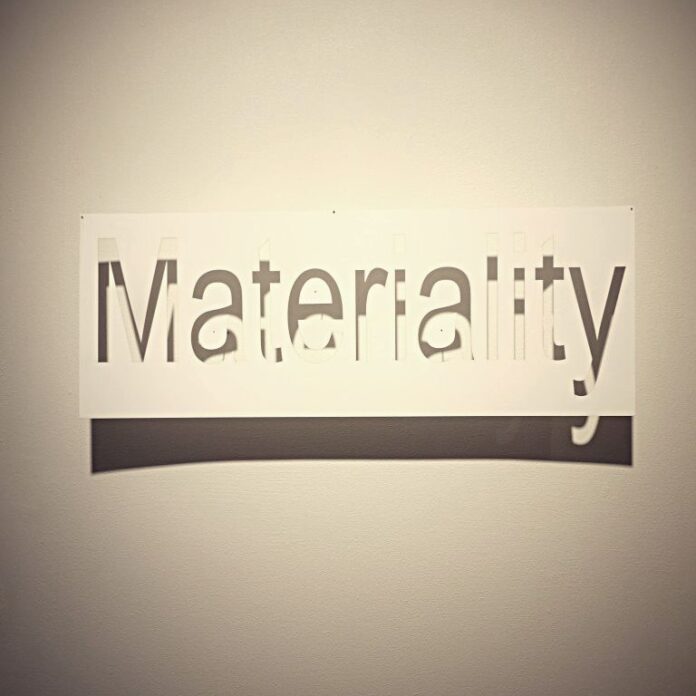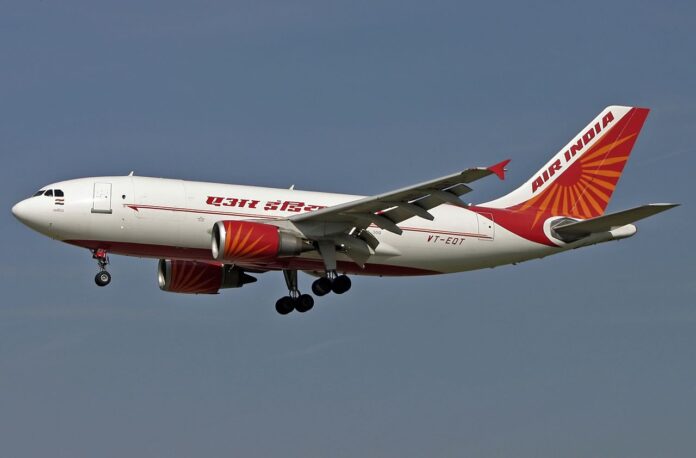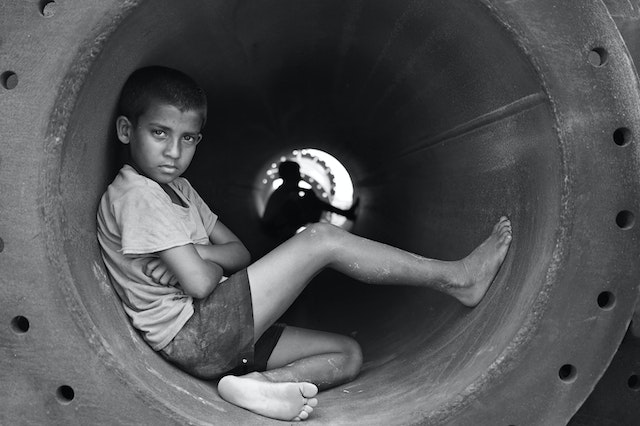The CSR Journal is filling a big vacuum in India today, by bringing an understanding of CSR to civil society. I expect a web magazine like yours could make CSR a matter of conscience rather than law. I’m sure you will touch that conscience.
CSR Workshop For Mumbai NGOs
Corporate Social Responsibility is now seen as ethical and smart way to conduct business, making corporate entities into socially responsible organizations, visibly contributing to the social good. The Company Act 2013 has made CSR legally binding with a mandate. There will be around 16000 companies in India who have to set-up their full-fledged ‘CSR Department’ with 2-Existing and 1-Independent Director, and will be spending 2% of PAT (profit after tax) as CSR around Rs. 22,000 Cr yearly.
Such business regulations in India have already created a platform for NGOs to play a part in creating shared value, by recommending the implementation of CSR projects through NGOs and development sector agencies. Businesses are also viewing CSR not only as a means of ‘doing social good’ but also as a means of ‘value creation’. In this context, it is essential that NGOs understand the CSR landscape in India. After decades, CSR has created a new world of opportunities for the Indian youth. India will require more than 1,00,000 CSR trained professionals across the country for different Corporate, Business Houses, Foundations and NGOs.
So your NGO is excited about the new Company Act, hoping to make good this financial year with CSR funds, but is your NGO ready and prepared to work with corporations? Is your house in order before you venture out to address the corporate mandates? Have you customized your services and products to fulfill your organization’s mission as well as the corporate mandate? More importantly, do you have a fair idea about the new CSR law? If your answer for any of these questions is NO, you should be then attending our FREE day-long workshop which will help you to get these answers.
The Ladybird Environmental Consulting (LEC), an environmental social enterprise in collaboration with Maharashtra Nature Park (MNP) invites all NGO professionals to attend this unique workshop. Participants will receive their e-certificates on completion of the workshop.
Date: 27 July 2014
Venue: Auditorium of Maharashtra Nature Park, Opp. to Dharavi Bus Depot, Mumbai-400016
Time: 10.00 a.m to 3.00 p.m.
Programme: Overview of CSR, Meet Managers, Group work on packaging services and products, Identification of potential Corporates to work with.
How to Register: Fill the online registration form at www.ladybirdconsulting.co.in or send an email to consultladybird@gmail.com
Contact: Dr. V.Shubhalaxmi, Founder & Director at 9820165525
A Ramadan To Remember In Dubai
THE holy month of Ramadan always sees a number of wp initiatives in Dubai and UAE by individuals and corporates alike. This year too, a variety of wp campaigns are bringing the spirit of Ramadan alive among the cross-section of UAE residents.
Chief among them is the ruler of Dubai, Sheikh Mohammed bin Rashid Al Maktoum, spearheading a campaign every year by taking up a vital cause. This year, the Sheikh’s campaign for Ramadan is to provide clean water for 5 million people. The campaign has seen a collection of 90 million dirhams in just eight days – the key contributors have been big local firms and individual expats.
Several other wp initiatives are following suit. One of the two telecom companies ‘du’ is running a campaign called 30 Days of Sharing. Social media users (using #30DaysofSharing) are invited to share their special Ramadan moments. Every post made using this hashtag will see ‘du’ donate AED10 towards Iftar meals to be distributed to the less fortunate at mosques.
A couple of residents of Dubai have got together to serve 130 labourers every day of Ramadan. “Our campaign is called Filling Blue Belly as the labourers wear blue uniforms. It’s a great time to be philanthropic even in a small way, “ says Debbie Rogers, part of Filling Blue Belly initiative.

Hotels and Henna
Meanwhile, Saleh Bin Lahej (SBL) group has launched its “Dine for a Cause” campaign in all its group restaurants during the Holy month of Ramadan. During the entire month of Ramadan, all restaurants of the SBL group will exhibit and sell merchandise from both, Dubai Centre for Special Needs (DCSN) and Al Noor Training Centre for Special Needs (Al Noor). All proceeds from all the restaurants on the 15th day of Ramadan will be contributed to these two organizations that work with special children.
Mohammed Saleh Bin Lahej, Group CEO, said, “Our restaurants have always been popular in the UAE and by adding an element of philanthropy to the concept of getting together to celebrate with family and friends, we hope to inspire others to contribute more.”
In the spirit of the season, even some malls in Dubai have put up Henna tents – the proceeds will be given to a charity chosen by the mall.

Abu Dhabi-based Cristal Hotels & Resorts is to work with the UAE Red Crescent to support its ‘Ramadan to Remember’ wp programme. The hotel will host an Iftar dinner at its Gems restaurant for 20 orphaned children, nominated by the Red Crescent, with gifts, games, and live entertainment. As part of the campaign, local corporations and organisations will be invited to sponsor Iftar evenings during Ramadan for AED2500 per night for up to 20 children. Cristal Hotels will also donate AED20 to the Red Crescent for every standard room booked during the holy month.
Cristal COO Kamal Fakhoury said, “ Ramadan is synonymous with generosity and kindness, and we look forward to opening our hearts and doors to these less fortunate children to enable them to have a good time. Our ‘Ramadan to Remember’ package allows corporations to do that little bit extra for the community.”
Opinion: Renew Emphasis On Impact Assessment
AS we know, “The Materiality Principle”, as defined in the G3 Guidelines (2006), has not changed in G4. The Materiality Principle states that the report should cover aspects that: reflect the organization’s significant economic, environmental and social impacts; or substantively influence the assessments and decisions of stakeholders.”. Here I am assuming companies are taking materiality seriously and are really serious about diligently undertaking materiality assessments before reporting. What changes in G4 is “Organizations are requested to identify and describe where impacts occur for each material Aspect identified. In setting the Aspect Boundaries, an organization should consider impacts within and outside of the organization.” Therefore the logical conclusion is that there would be a renewed interest in Social and Environmental Impact Assessments across the value chain.
In India, Social and Environmental Impact Assessments have been categorized according to the EIA 2006 notification. For all those companies that do not fall under the purview of this notification, EIA or Social Impact Assessments do not fall in their agenda at all. This does not however negate the fact that these companies are probably under the “non-polluting industries” or do not fit the criteria for categorizing of projects. Also Impact Assessment is necessary for obtaining environmental clearance and once the projects are operational continuous monitoring is something that is not strictly followed.
So therefore will the inclusion of assessment of significant economic and environmental and social impacts in the context of materiality bring back the emphasis on undertaking impact assessments without the stick of regulation. If it does, we would definitely have to restructure Social and Environmental Impact Assessments to adopt it to assess companies activities.
Some of the questions that come to my mind are :
1. Do companies look at impact assessment in the context of materiality?
2. Do we need to rethink how to conduct effective impact assessments and adapt and modify the SEIA methodologies to identify sustainability risks and impacts and therefore opportunities for improvement?
If you have case studies you would like to share where impact assessment has been undertaken in the context of material issues for reporting, do write in to editor@thewpjournal.in
More Than Just A Courtesy Call?
His movie ‘Fanaa’ was banned from theaters across Gujarat in 2006 when he decided to stand by the ‘Narmada Bachao Andolan’. But that did not stop this ‘responsible star’ from meeting Narendra Modi to submit petitions gathered from a nationwide, loyal audience of his socially empowering TV Show Satyamev Jayate. While the PMO may have chosen to call this meeting a ‘courtesy call’, the actor tweeted hopefully about his new Prime Minister saying “He has assured me that he will look into all the matters”.

A quick look at the official website of Satyamev Jayate (http://www.satyamevjayate.in/) and you will know that Aamir Khan means business. After exhorting the entire nation to take a pledge to not sell its vote or vote for politicians with criminal charges, now with the new Government firmly in place he continues with an active, impact-driven follow up.
‘The results are out,’ says a section of the website dedicated to decriminalization of Politics. ‘The winners of the 2014 Lok Sabha elections have been declared. The people have made their decision.

However, from among the leaders who will shape the future of the country, almost one-third have criminal cases filed against them. That is, 186 (34%) out of the 541 winners whose details were analyzed by the Association of Democratic Reforms. This is a jump from the numbers for the 2009 elections, when, out of the 521 winners analyzed, 158 (30%) had declared criminal cases. If you were to look at the data through the party-wise lens, the picture remains grim. 98 (35%) out of 281 winners analyzed from the BJP, 8 (18%) out of 44 winners from the Congress, 6 (16%) out of 37 winners from the AIADMK, 15 (83%) out of 18 winners from the Shiv Sena and 7 (21%) out of 34 winners from the AITC have been charged with criminal cases. Given this scenario, it is imperative that we continue the struggle for the decriminalization of politics at every level of government.’

Aamir’s meeting with the PM clearly reflects on the Bollywood superstar’s commitment and passion that is embodied in his show’s tagline ‘Jinhe Desh ki Fikr hai…’ More power to Aamir who is currently busy with the next season of Satyamev Jayate, and here’s hoping that the ‘courtesy call’ translates into concrete action on the petitions (one petition per Show) that the star has submitted to Narendra Modi.
AI’s Iraq Evacuation Plan Now Under wp
NATIONAL carrier Air India’s Corporate Social Responsibility commitments, hitherto restricted to reducing carbon emissions and tree plantations, is now being aimed at more people-centric results. This time, the national carrier has brought its plans to evacuate Indians from war-torn Iraq under the ambit of its wp activity. Senior officials say the new wp provisions have been the reason for the decision to include evacuation efforts under wp.
An e-mail by Harpreet Singh, executive director, customer services, to cabin crew on June 25 had stated, “As part of Air India’s corporate social responsibility (wp) and humanitarian response, it is planned to evacuate 6,500 Indian nationals from Iraq. In light of the same, all cabin crew to please ensure full availability for all extras-section flights and let us all together rise up to the situation. I am confident that I can count on your support”.
Previously, the airline has launched several successful evacuation operations for Indian citizens from strife-torn regions like Libya, Egypt and Kuwait. Sources say this is the first time these efforts have been brought under the wp umbrella.
The airline has also reportedly issued an urgent tender on June 27 inviting charter aircraft on a wet-lease basis or hired with pilots and cabin crew for the purpose of evacuation of Indians from Iraq. But cabin crew and pilot associations, which have been at odds with the management over a series of long-standing issues (including flight duty time limit and salary considerations), say news of this tender has come as a surprise, and they have been asked to remain on standby for the evacuation plans.
In a statement, Capt. Rishabh Kapur, General Secretary, Indian Commercial Pilots’ Association, said “In spite of our hardships being faced in the airline where by 25 percent of our allowances are being cut unilaterally for the last 2 years which has brought down the morale of all employees of Air India, we as a responsible Union body will always work with the interest of the nation close to our hearts.”
The state-owned airline has kept three planes on standby for evacuation of Indian nationals in Iraq. The Government has also decided to transfer part of welfare funds in the Indian missions in Gulf countries to its embassy in Baghdad to be used for helping Indians to facilitate the departure of its nationals.
According to the External Affairs Ministry, there are an estimated 10,000 Indian nationals in that country. An MEA spokesman said there were around 150 Indians in the zone of conflict and about 50 of them have left, leaving around 100 Indian still in the conflict zone.
MCA’s Latest Clarifications On wp
The Ministry of Corporate Affaires has received several references and representation from stakeholders seeking clarifications on the provisions under Section 135 of the Companies Act, 2013 (herein after referred as ‘the Act’) and the Companies (Corporate Social Responsibility Policy) Rules, 2014, as well as activities to be undertaken as per Schedule VII of the Companies Act, 2013. Clarifications with respect to representations received in the Ministry on Corporate Social Responsibility (herein after referred as (‘wp’) are as under:-
(i) The statutory provision and provisions of wp Rules, 2014, is to ensure that while activities undertaken in pursuance of the wp policy must be relatable to Schedule VII of the Companies Act 2013, the entries in the said Schedule VII must be interpreted liberally so as to capture the essence of the subjects enumerated in the said Schedule. The items enlisted in the amended Schedule VII of the Act, are broad-based and are intended to cover a wide range of activities as illustratively mentioned in the Annexure.
- (ii) It is further clarified that wp activities should be undertaken by the companies in project/ programme mode [as referred in Rule 4 (1) of Companies wp Rules, 2014]. One-off events such as marathons/ awards/ charitable contribution/ advertisement/ sponsorships of TV programmes etc. would not be qualified as part of wp expenditure.
- (iii) Expenses incurred by companies for the fulfillment of any Act/ Statute of regulations (such as Labour Laws, Land Acquisition Act etc.) would not count as wp expenditure under the Companies Act.
- (iv) Salaries paid by the companies to regular wp staff as well as to volunteers of the companies (in proportion to company’s time/hours spent specifically on wp) can be factored into wp project cost as part of the wp expenditure.
- (v) “Any financial year” referred under Sub-Section (1) of Section 135 of the Act read with Rule 3(2) of Companies wp Rule, 2014, implies ‘any of the three preceding financial years’.
- (vi) Expenditure incurred by Foreign Holding Company for wp activities in India will qualify as wp spend of the Indian subsidiary if, the wp expenditures are routed through Indian subsidiaries and if the Indian subsidiary is required to do so as per section 135 of the Act.
- (vii) ‘Registered Trust’ (as referred in Rule 4(2) of the Companies wp Rules, 2014) would include Trusts registered under Income Tax Act 1956, for those States where registration of Trust is not mandatory.
(viii) Contribution to Corpus of a Trust/ society/ section 8 companies etc. will qualify as wp expenditure as long as (a) the Trust/ society/ section 8 companies etc. is created exclusively for undertaking wp activities or (b) where the corpus is created exclusively for a purpose directly relatable to a subject covered in Schedule VII of the Act.
2. This issues with the approval of Competent Authority.
Annexure referred to at para (i) of General Circular No. 21/2014 dated 18.06.2014
|
SI. No. |
Additional items requested to be included in Schedule VII or to be clarified as already being covered under Schedule VII of the Act |
Whether covered under Schedule VII of the Act |
|
1. |
Promotion of Road Safety through wp: (i) (a) Promotions of Education, “Educating the Masses and Promotion of Road Safety awareness in all facets of road usage, (b) Drivers’ training, (d) Safety traffic engineering and awareness through print, audio and visual media” should be included. Social Business Projects : (ii) |
(ii) Schedule VII (i) under ‘promoting health care including preventive health care.’ |
|
2. |
Provisions for aids and appliances to the differently- able persons – ‘Request for inclusion |
Schedule VII (i) under ‘promoting health care including preventive health care.’ |
|
3. |
The company contemplates of setting up ARTIIC (Applied Research Training and Innovation Centre) at Nasik. Centre will cover the following aspects as wp initiatives for the benefit of the predominately rural farming community: (a) Capacity building for farmers covering best sustainable farm management practices. (b) Training Agriculture Labour on skill development. |
Item no. (ii) of Schedule VII under the head of “promoting education” and “vocational skills” and “rural development”. (a) “Vocational skill” livelihood enhancement projects. (b) “Vocational skill” |
|
(c) Doing our own research on the field for individual crops to find out the most cost optimum and Agri – ecological sustainable farm practices. (Applied research) with a focus on water management. (d) To do Product Life Cycle analysis from the soil conservation point of view. |
(c) ‘Ecological balance’, ‘maintaining quality of soil, air and water’. (d) “Conservation of natural resource” and ‘maintaining quality of soil, air and water’. |
|
|
4. |
To make “Consumer Protection Services” eligible under wp. (Reference received by Dr. V.G. Patel, Chairman of Consumer Education and Research Centre).
|
Consumer education and awareness can be covered under Schedule VII (ii) “promoting education”. |
|
5. |
a) Donations to IIM [A] for conservation of buildings and renovation of classrooms would qualify as “promoting education” and hence eligible for compliance of companies with Corporate Social Responsibility. b) Donations to IIMA for conservation of buildings and renovation of classrooms would qualify as “protection of national heritage, art and culture, including restoration of buildings and sites of historical importance” and hence eligible for compliance of companies with wp. |
Conservation and renovation of school buildings and classrooms relates to wp activities under Schedule VII as “promoting education”. |
|
6. |
Non Academic Technopark TBI not located within an academic Institution but approved and supported by Department of Science and Technology. |
Schedule VII (ii) under “promoting education”, if approved by Department of Science and Technology. |
|
7. |
Disaster Relief |
Disaster relief can cover wide range of activities that can be appropriately shown under various items listed in Schedule VII. For example,
under ‘sanitation and making available safe drinking water’. |
|
8. |
Trauma care around highways in case of road accidents. |
Under ‘health care’. |
|
9. |
Clarity on “rural development projects” |
Any project meant for the development of rural India will be covered under this. |
|
10. |
Supplementing of Govt. schemes like mid-day meal by corporates through additional nutrition would qualify under Schedule VII. |
Yes. Under Schedule VII, item no. (i) under ‘poverty and malnutrition’. |
|
11. |
Research and Studies in the areas specified in Schedule VII. |
Yes, under the respective areas of items defined in Schedule VII. Otherwise under ‘promoting education’. |
|
12. |
Capacity building of government officials and elected representatives – both in the area of PPPs and urban infrastructure. |
No. |
|
13. |
Sustainable urban development and urban public transport systems |
Not covered. |
|
14. |
Enabling access to, or improving the delivery of, public health systems be considered under the head “preventive healthcare” or “measures for reducing inequalities faced by socially & economically backward groups”? |
Can be covered under both the heads of “healthcare” or “measures for reducing inequalities faced by socially & economically backward groups”, depending on the context. |
|
15. |
Likewise, could slum re-development or EWS housing be covered under “measures for reducing inequalities faced by socially & economically backward groups”? |
Yes. |
|
16. |
Renewable energy projects |
Under ‘Environmental sustainability, ecological balance and conservation of natural resources’, |
|
17. |
(i) (ii) Are the initiatives mentioned in Schedule VII exhaustive? In case a company wants to undertake initiatives for the beneficiaries mentioned in Schedule VII, but the activity is not included in Schedule VII, then will it count (as per 2(c)(ii) of the Final Rules, they will count)? |
(i) & (ii) Schedule VII is to be liberally interpreted so as to capture the essence of subjects enumerated in the schedule. |
|
18. |
US-India Physicians Exchange Program – broadly speaking, this would be program that provides for the professional exchange of physicians between India and the United States. |
No. |
****************************














